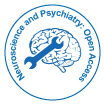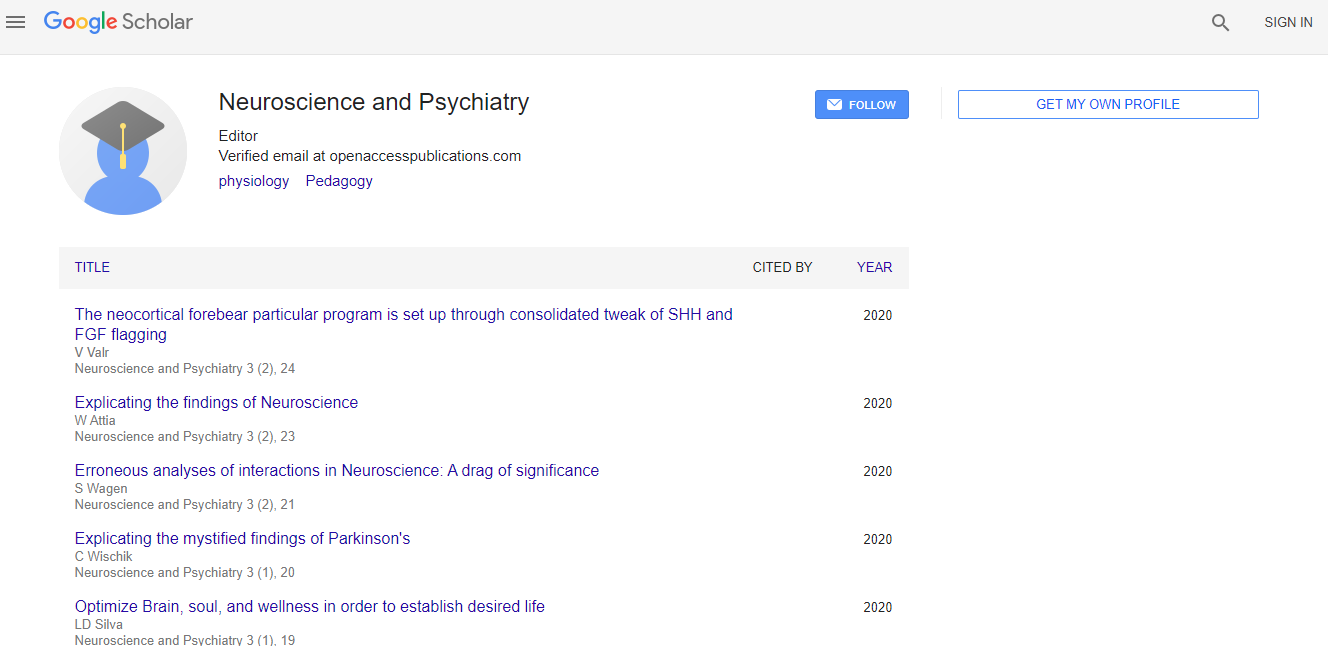Our Group organises 3000+ Global Conferenceseries Events every year across USA, Europe & Asia with support from 1000 more scientific Societies and Publishes 700+ Open Access Journals which contains over 50000 eminent personalities, reputed scientists as editorial board members.
Open Access Journals gaining more Readers and Citations
700 Journals and 15,000,000 Readers Each Journal is getting 25,000+ Readers
Editorial Board
Submit Manuscript
Journal Impact Factor 0*
Submit manuscript at or send as an e-mail attachment to the Editorial Office at neuroscience@journalsoa.org
If you are interested in publishing with us or have any questions, please feel free to contact us directly on WhatsApp .
Table of Contents
About the Journal
Neuroscience and Psychiatry: Open Access is a peer-reviewed journal aimed at publishing both basic and clinical research in all areas pertaining to neurology, and the pathophysiology and treatment of neuropsychiatric disorders.
The Journal features articles on a variety of neuropsychiatric conditions such as: clinical neuropsychiatry, cognitive neuropsychiatry, neuroimaging, neuropsychology of mental illness, behavioral neurology, Sleep Disorders, Neurocognitive Disorders, Depressive Disorders, Stress & Affective Disorders, neuropsychology and the cognitive neurosciences etc., with special focus on diagnostic and treatment strategies for these disorders such as: Neuro Imaging, Psychopharmacology, Cognitive Therapy, Psychotherapy, and Behavior Therapy.
The primary focus of the Journal lies in exploring the molecular, genetic, and environmental mechanisms underlying these conditions, dissection of the neural circuits, and achieving a better understanding of the nervous system as a whole. Special emphasis is placed on animal models of neuropsychiatric disorders.
The distinguished scientists in the Editorial Board of the Neuroscience and Psychiatry: Open Access subjects the manuscripts through a vigorous peer-review process to ensure quality and originality. In addition to Research Articles, the Journal also publishes high quality Commentaries, Reviews, and Perspectives aimed at encapsulating the latest knowledge and synthesizing new theories and treatment strategies for the management of neuropsychiatric disorders.
The team at the Neuroscience and Psychiatry: Open Access takes immense pride in providing the authors with a streamlined and unbiased publishing process. Neuroscience and Psychiatry: Open Access provides an encouraging platform to the scientists for sharing their invaluable contributions to the field.
Psychiatry
Psychiatry is defined as a branch of medical practice devoted to the diagnosis , prevention, study, and treatment of mental disorders. These include various abnormalities related to mood, behaviour, cognition, and perceptions.
Neuroscience
Neuroscience (or neurobiology) is defined as the scientific study of the nervous system. It is a branch of biology deals with the anatomy, biochemistry, molecular biology, and physiology of neurons and neural circuits.
Reductionism
Reductionism is a practice of analysing and describing a complex phenomenon into its simple or fundamental constituents, especially when it is to provide a sufficient explanation.
Pedagogy
Pedagogy is the define as a branch of knowledge that deals with the theory and practice of teaching in psychiatry.
Philosophy of psychiatry
Philosophy of Psychiatry discussed about the philosophical question related to psychiatry and mental illness. Science is the first concerns for the examination of psychiatry by using the tools of the philosophy of science more broadly. The second involves concept employed examination in discussion of mental illness, including the experience of mental illness, and the related questions it raises. The third area concerns the interaction and discontinuities between the philosophy of mind and psychopathology.
Philosophy of psychology
Philosophy of psychology discussed about the theoretical foundations of psychology. Some of these cases concerns about the methodology of Psychological investigation.
Philosophy of science
Philosophy of science is a sub-division of philosophy deals with the foundations, methods, and implications of science. The central questions of this study concern what qualifies as science, the reliability of scientific theories, and the ultimate purpose of science.
Mind
The mind is defined as a set of cognitive faculties that include consciousness, perception, thinking, judgement, and memory. It holds the power of imagination, recognition, and appreciation, and also it is responsible for processing feelings and emotions, resulting in attitudes and actions.
Consciousness
Consciousness is defined as the state or quality of awareness, or, of being aware of an external object or something within oneself. It has been defined variously in terms of sentience, awareness the ability to experience or to feel, wakefulness, having a sense of selfhood or soul and the executive control system of the mind .In contemporary philosophy its definition is often hinted at via the logical possibility of its absence, the philosophical zombie, which is defined as a being whose behaviour and function are identical to one's own yet there is "no-one in there" experiencing it.
Brain
The human brain is the central organ of the human nervous system along with the spinal cord makes up the central nervous system. The brain consists of the cerebrum, the brainstem and the cerebellum. It controls most of the activities of the body, processing, integrating, and coordinating the information it receives from the sense organs, and making decisions as to the instructions sent to the rest of the body.
Neuropsychology
Neuropsychology studies about the structure and function of the brain as they are relate to specific psychological processes and behaviours. It is an experimental field of psychology that aims to understand how behaviour and cognition are influenced by brain functioning and is concerned with the diagnosis and treatment of behavioural and cognitive effects of neurological disorders. Whereas classical neurology focuses on the physiology of the nervous system and classical psychology is largely divorced from it, neuropsychology seeks to discover how the brain correlates with the mind. It thus shares concepts and concerns with neuropsychiatry and with behavioural neurology in general. The term neuropsychology has been applied to lesion studies in humans and animals. It has also been applied to efforts to record electrical activity from individual cells (or groups of cells) in higher primates (including some studies of human patients). It is scientific in its approach, making use of neuroscience, and shares an information processing view of the mind with cognitive psychology and cognitive science.
Plasticity
Plasticity is defined in terms of Biology as the adaptability of an organism to changes in its environment or differences between its various habitats. It is found throughout the nervous system and is the key aspects of development, learning and memory, and repair.
Training
Training is the action of teaching a person or animal a particular skill or type of behaviour. In this type we are analysing about the human brain and behaviour of human
Intervention
Intervention is defined as the process taken on focusing on the early diagnosis and treatment of all mental health problems and disorders, and the journal promotes the importance of early intervention in psychiatric practice intervention.
Developmental cognitive neuroscience
Developmental cognitive neuroscience is a scientific field deals with the study of the biological processes and aspects that underlie cognition that focus on the neural connections in the brain which are involved in mental processes.
Psychiatry
Psychiatry is defined as a branch of medical practice devoted to the diagnosis , prevention, study, and treatment of mental disorders. These include various abnormalities related to mood, behaviour, cognition, and perceptions.
Journal Highlights
Fast Editorial Execution and Review Process (FEE-Review Process):
Neuroscience and Psychiatry: Open Access is participating in the Fast Editorial Execution and Review Process (FEE-Review Process) with an additional prepayment of $99 apart from the regular article processing fee. Fast Editorial Execution and Review Process is a special service for the article that enables it to get a faster response in the pre-review stage from the handling editor as well as a review from the reviewer. An author can get a faster response of pre-review maximum in 3 days since submission, and a review process by the reviewer maximum in 5 days, followed by revision/publication in 2 days. If the article gets notified for revision by the handling editor, then it will take another 5 days for external review by the previous reviewer or alternative reviewer.Acceptance of manuscripts is driven entirely by handling editorial team considerations and independent peer-review, ensuring the highest standards are maintained no matter the route to regular peer-reviewed publication or a fast editorial review process. The handling editor and the article contributor are responsible for adhering to scientific standards. The article FEE-Review process of $99 will not be refunded even if the article is rejected or withdrawn for publication.
The corresponding author or institution/organization is responsible for making the manuscript FEE-Review Process payment. The additional FEE-Review Process payment covers the fast review processing and quick editorial decisions, and regular article publication covers the preparation in various formats for online publication, securing full-text inclusion in a number of permanent archives like HTML, XML, and PDF, and feeding to different indexing agencies.
Recently Published Articles
-
Comparison of Lithium and Valproate Concentration in Serum During Three Different Patients Treated by Lithium Carbonate, Sodium Valproate and Their Combination: A Preliminary Study
Zhu JF, Jin Weidong, Jin R, Ma YC and Ren ZB -
Current Trends in the Treatment of Subarachnoid Hemorrhage Secondary to Aneurysmal Rupture
Ortega Zufiria JM, Ferncandez PJ, Poveda Nunez PD, Tamarit Degenhardt M and Lopez Serrano R -
Exercise for Cardiovascular Integrity and Plasticity During Ageing
Trevor Archer -
The Era of Epigenetics: Therapy Influencing Gene Expression
Michael D Callifronas

 Spanish
Spanish  Chinese
Chinese  Russian
Russian  German
German  French
French  Japanese
Japanese  Portuguese
Portuguese  Hindi
Hindi 



